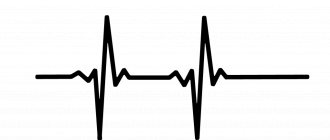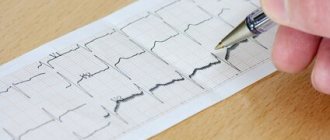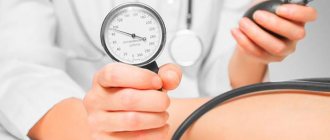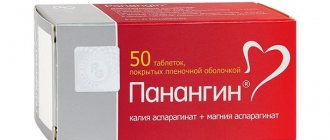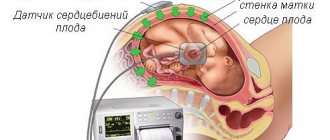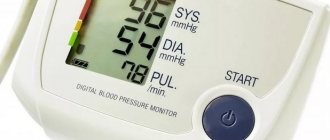The feeling of palpitations with a normal pulse is sometimes a symptom of arrhythmia, myocarditis, endocarditis, cardiosclerosis, myocardial dystrophy, hypertension, or heart disease. The reasons may be a problem with the thyroid gland, adolescence or menopause. Milder cases are ARVI with fever, stress, fatigue, stimulating drinks, smoking, gluttony.
The doctor will determine the cause using auscultation, ECG, ultrasound of the heart, and blood tests. He will prescribe treatment for the underlying disease, after which the symptom will go away. Together with the drugs Digoxin, Korglykon, Concor and others, you can drink decoctions of rose hips, lemon balm, and mint. A healthy lifestyle will help prevent the problem.
Feeling of palpitations with a normal pulse - what is it, the main reasons
The sensation of palpitations with a normal pulse is a condition that requires investigation, caused by one of the reasons:
- Arrhythmia. With this heart disease, the heart beats unevenly, but the heart rate may remain the same. Or increase, but not fall outside the norm.
- Infectious myocarditis or endocarditis. These are inflammatory diseases of the myocardium and inner lining of the heart, caused by viruses or bacteria. One of the symptoms of both is increased heartbeat.
- Cardiosclerosis. Here, normal heart tissue is replaced by connective tissue due to metabolic disorders or previous illness, high loads, problems with hematopoiesis, and thyroid gland. Therefore, the conductivity of impulses is disrupted, and arrhythmia can form.
- Myocardial dystrophy. When the disease occurs, the myocardium undergoes negative changes, as a result of which its functions are also impaired. This results in oxygen deficiency, shortness of breath, rapid heart rate, loud heart sounds and extraneous noises. The pulse may not fall outside the normal range. That is, he seems to be normal, but the person feels bad.
- Heart disease. There are many options here, and not all of them are congenital; there are also acquired ones. Some defects present at birth may become apparent over time.
- Arterial hypertension. With increased pressure, the functioning of the ventricles of the heart is disrupted. This and other changes lead to tachycardia.
If it seems that your heart is beating faster than usual, or there are other signs of deterioration in health (headache, heaviness in the chest, shortness of breath, nausea, fear), you should see a doctor.
Attention to body sensations is associated with anxiety
The increase in fear that Garfinkel observed in her experiment may be even greater in anxious people. Garfinkel's goal is to discover the relationship between interoceptive ability and mental disorder, and then use interoception as a tool to treat it.
According to Garfinkel, we still know very little about interoception.
Anxious people are sometimes overly focused on how their body feels. But it may be difficult for them to know whether they are paying increased attention to the heartbeat because they are anxious, or whether they are anxious because they are paying increased attention to the heartbeat.
Anxious people often believe that they have better interoceptive abilities. But it is not always the case. Garfinkel found that a discrepancy, either one way or the other, between one's perceived and actual ability to feel one's heartbeat can be a sure sign of anxiety. Garfinkel also found low interoceptive ability in people with autism.
“The connection between interoception and mental disorders has not received enough attention in modern science,” says Sahib Khalsa of the Oklahoma Brain Institute. But the situation is gradually changing, says Khalsa.
It is becoming increasingly clear that interoceptive deficits are observed in a wide range of disorders: depression, panic and somatoform disorders, eating disorders, substance use disorders and post-traumatic stress disorder.
Why does the heart beat strongly during normal heart rate and hormonal imbalance?
Strong heartbeats with a normal pulse may indicate that hormones are involved in changes in well-being:
- This happens with thyroid dysfunction. Excess hormones with a diagnosis of “hyperthyroidism” or “thyrotoxicosis” affect the functioning of the heart. It pumps blood with great effort. Additional signs in this case include shortness of breath, weakness, irritability or anxiety, problems sleeping, and sometimes a temperature of up to 37.1-37.4 degrees. The latter appears and disappears within 24 hours, and this is repeated every day.
- Adolescence or menopause in women. In the first case, both boys and girls experience a feeling of increased heart function. This happens with rapid physical development and rapid hormonal changes. It is also accompanied by changes in mood, sometimes weakness.
Menopause also occurs with changes in this area - the production of estrogen by the ovaries fades away. And the substances regulate the functioning of the cardiovascular system. If menopause is to blame for the increased heartbeat, the symptom is complemented by a feeling of heat throughout the body and increased sweating.
You can learn to feel your body
Interoceptive ability was previously thought to be immutable, but Garfinkel believes it can be developed. She tried to teach people to become more aware of their heartbeat and claims that those who succeeded in this began to experience fewer symptoms of anxiety.
Khalsa also began treating people suffering from anxiety and panic attacks through interoception. He called his method interoceptive exposure. Its essence is to relieve patients from feeling threatened when experiencing sensations that usually cause anxiety.
Garfinkel believes that interoceptive exposure can also help people suffering from psychosis. Khalsa agrees: “Patients with schizophrenia often experience visual and auditory hallucinations, which means their perception is focused on the external world, which in turn affects the ability to concentrate on what is happening internally.”
I feel my heart beating with a normal pulse: rare causes
If a person feels his heart beating with a normal pulse, this may be due to the following factors:
- recent physical activity, as well as lack of sleep;
- stress, that is, sudden and intense joy or negative emotion;
- an abundance of cigarettes smoked, coffee or alcohol drunk;
- overeating, especially when the food was fatty or spicy;
- low hemoglobin, characteristic of dieters, pregnant women and with pathologies of the stomach and intestines with impaired absorption of nutrients;
- deficiency of potassium in the body;
- neurotic state, that is, chronic stress;
- food or chemical poisoning;
- infections, other diseases accompanied by fever;
- taking certain medications that have side effects.
You can add to this list the diagnosis “vegetative-vascular dystonia”, which Russian doctors like to make. In fact, it often hides a neurosis or one of the undetected cardiovascular and endocrine pathologies.
Causes
Certain diseases of the body and some consequences of life activities can cause pulsating noise in the ear.
Hypertension
The narrowing of blood vessels and, as a result, an increase in blood pressure initially causes blood pulsation, which the hearing organs perceive as a knocking sound. If, in addition to extraneous noise in the ears, hypertension is also observed, this is a reason to seek help from a doctor.
Inflammatory processes
Pulsation in the left or right ear can often be caused by inflammatory processes that occur within the organ itself. You can talk about otitis media if the pain is accompanied by:
- increased temperature ;
- release of fluid;
- impairment .
In turn, otitis media can be provoked by:
- ARVI or other infection;
- insufficient hygiene of the ear canal;
- decrease in the protective properties of the immune system.
Otitis makes itself felt with pronounced symptoms.
Atherosclerosis
The clinical picture of a largely hereditary disease is the formation of plaques inside the blood vessels. As a result, blood circulation deteriorates, and the turbulence of its movement is reflected as pulsations in the ear.
The situation is aggravated by bad habits and excess weight. As blood flow deteriorates, the brain and the body as a whole suffer. The person begins to experience dizziness and hearing loss.
Osteochondrosis
Pulsating tinnitus, expressed by whistling, knocking, crackling or clicking, can be triggered by the development of osteochondrosis. The deformation of the vertebrae and intervertebral discs characteristic of the disease increases pressure on the blood vessels of the cervical spine. As a result, blood transport to the middle and inner ear, as well as the brain, deteriorates.
Why can our articles be trusted?
We make health information clear, accessible and relevant.
- All articles are checked by practicing doctors.
- We take scientific literature and the latest research as a basis.
- We publish detailed articles that answer all questions.
Pulsating tinnitus is accompanied by deterioration of memory and vision, stiffness in the movements of the cervical vertebrae, and insomnia.
- Noise in the ears and head, causes and treatment. Folk remedies and medications for ear noise
Provokes the development of osteochondrosis:
- slouch;
- metabolic disorders (metabolism);
- weakened neck and back muscles
Tinnitus often occurs at night when trying to sleep.
Stress and physical exhaustion
Excessive emotional stress on the body can result not just in a feeling of pulsation in the ears, but also in “trying on” non-existent diagnoses. Trying to relieve stress, a person begins to listen more carefully to the surrounding sounds, the processes of his own body: he begins to hear the heartbeat, blood pulsation.
Against the backdrop of stress and overwork, the hearing becomes more acute and picks up the irritating ticking of a clock or the dripping of water in a tap, which only makes you feel worse.
Even an absolutely healthy person can suffer from pulsating tinnitus due to frequent stress.
Previous injuries and unilateral diseases
Noise signals to one of the hearing organs can be caused by unilateral diseases of the facial area or head. For example, injuries , sinusitis or inflammation of the lymph nodes. The clinical picture of the listed diseases and mechanical damage often contributes to the conversion of nerve impulses into noise.
Other reasons
In addition to the main reasons listed, the following factors can provoke sound pulsation in the ears:
- age-related changes, according to statistics, 20% of the world’s elderly population complain of ringing in their ears;
- neoplasms in the neck and head area;
- ear plugs, which are formed due to excessive accumulation of wax;
- long-term use of certain medications, in particular aspirin or Gentamitacin, an antibacterial agent whose active ingredients negatively affect the cells of the inner ear;
- frequent use of a headset to listen to music at high volume levels;
- stable flights;
- hormonal changes, which are often observed during pregnancy, during the period of waiting for a child, the water-salt balance is disturbed, which leads to swelling of the mucous membranes of organs.
Only specialists can identify the source of the problem through a thorough examination.
If your heart is beating loudly: diagnosis
When the pulse is normal, but the heart is beating strongly, you should first consult a physician. After all, heart rate norms have wide boundaries for each age. And for one person a pulse of 80 is optimal, while for another the same value is accompanied by a deterioration in well-being, as it is a symptom of an illness. The following methods will help to identify it or ensure the patient’s health:
- ECG,
- Ultrasound of the heart,
- blood test for hormones,
- general blood test.
It is also important to measure your blood pressure several times throughout the day and keep a diary. If the above diagnostic methods reveal a problem, they may additionally prescribe a chest x-ray, MRI, as well as consultation with specialists.
As a preventive measure
In order to prevent attacks of tachycardia, it is recommended:
- Avoid stress and high physical activity.
- Avoid drinking black tea and coffee or limit their consumption and give preference to green tea.
- Instead of tea, you can drink an infusion of hawthorn and rose hips, which helps normalize heart rate. To prepare it, mix the fruits of these plants in equal proportions, add boiling water and infuse.
- If tachycardia develops against the background of hypertension, green oat juice (drink 50 g three times a day) or infusion of blue cornflower flowers (take ½ glass three times a day) helps well. If you are prone to heart attacks with high blood pressure, it is recommended to take a tablespoon a day of Adonis infusion and drink green tea with mint or lemon balm leaves.
How to treat palpitations with normal pulse and blood pressure
To eliminate the feeling of palpitations with normal pulse and pressure, you need to identify the cause and fight it:
- If heart problems are established, heart-supporting medications are prescribed to normalize the rhythm. These are, for example, Digoxin, Corglicon, Bisoprolol or Concor, Atenolol, Novodigal.
- In case of hyperfunction of the thyroid gland, medications are selected that reduce the production of hormones. These may be Mercazolil, Propicin, Tyrosol or glucocorticosteroids.
- For neurotic origins of increased heartbeat, Glycine, Valerian Extract, Motherwort Forte, Novo-Passit are prescribed. But they can also prescribe stronger sedatives from the group of antidepressants and tranquilizers.
- Infectious diseases are treated with antibiotics. Along with them, medications that restore normal heart rhythm and vitamins may be prescribed.
- If the cause of the problem is anemia, its nature is identified and iron supplements are prescribed. These are Sorbifer, Maltofer, Aktiferrin, Fenyuls. They also adjust their diet and lifestyle in general.
Whatever the cause of increased heartbeat, medications and their dosage should be selected by a specialist. Self-medication can quickly and seriously worsen your health.
Diseases that cause palpitations
If the above methods of relieving the unpleasant sensation did not help, you should consult a doctor about this problem. As in other cases, when your health worsens, you should not delay making an appointment with a specialist.
Let's look at the main diseases due to which, in the absence of visible reasons, a heartbeat can be felt.
Arrhythmia
If, along with palpitations, you also experience weakness, dizziness, headaches , and your attention has become distracted, it is quite possible that we are talking about arrhythmia .
Take a closer look at how you feel.
Arrhythmia is characterized by the following symptoms:
- palpitations are accompanied by strong pulsation in the neck, temples, fingertips, tinnitus and difficulty breathing
- I am worried about pain in the chest , behind the sternum. It can be aching, stabbing, burning, accompanied by difficulty breathing, cold sweat, nausea;
- shortness of breath appears . Breathing becomes frequent and noisy. If shortness of breath occurs at rest or with slight physical exertion, its nature is pathological. It is cardiovascular diseases that lead to insufficient blood circulation. Organs do not receive the required amount of oxygen, instead accumulating carbon dioxide.
Types of arrhythmias
Atrial fibrillation. An abnormal heart rhythm during which the atria contract faster than the ventricles. This is a complication due to coronary heart disease.
Diseases of the endocrine system can also cause the development of atrial fibrillation. Unlike normal heartbeat, muscle fibers in atrial fibrillation are excited frequently and chaotically. In addition to frequent contractions of the heart muscle, the disease is accompanied by increased sweating, darkening of the eyes, muscle weakness and fainting .
Sinus arrhythmia. During the disease, the sinus node, the main “engine” of impulses in the heart, is damaged. Because of this, the sinus node begins to malfunction. With sinus arrhythmia, an alternation of rapid and slow rhythm occurs. A common type of sinus arrhythmia occurs, in which during inhalation the heart rate increases, and when exhaling, on the contrary, it decreases. This disease is also called respiratory arrhythmia. The pathology is accompanied by dizziness, severe fatigue, breathing problems, and loss of consciousness .
Atrial flutter. This is a rapid atrial rhythm, reaching 200-400 beats per minute. The reasons for the deviation may be complications after other cardiovascular diseases, the postoperative period, severe stress, or pathological processes in the body. Accompanied by symptoms such as general weakness, discomfort in the chest or behind the sternum, shortness of breath and sudden attacks of rapid heartbeat.
Diagnosis of arrhythmia
If you suspect an arrhythmia, you need to consult a specialist for examination and diagnosis to confirm or refute the diagnosis. A cardiologist examines and treats arrhythmias .
Arrhythmia is a dangerous disease, so you should never self-medicate. Any medications can only be prescribed by a doctor. The drug itself, if taken incorrectly, can cause arrhythmia attacks.
This is interesting: Bipolar disorder: signs, diagnosis, treatment
At the initial appointment with a cardiologist, the doctor will ask questions about symptoms and the frequency of their manifestations, listen to the heart and measure the pulse. It is important to provide your entire medical history to your doctor. To find out the causes of arrhythmia, you will need to undergo basic tests: b
- blood chemistry;
- blood test for clotting.
For further research and to exclude more serious pathologies, you will undergo an instrumental diagnostic study.
Noise in the ears (tinnitus)
Tinnitus (from Latin tinnire) is ringing or noise in the ears . In most cases it is a high-pitched sound, reminiscent of the ringing of a bell.
Tinnitus is not a disease, but a symptom caused by various reasons, such as foreign objects, earwax or inflammation in the ear, cerebral atherosclerosis, as well as allergies that impede or, conversely, cause the flow of fluid and lead to stagnation of earwax.
Tinnitus or ringing in the ears can also be caused by natural hearing loss (particularly as a result of aging), a side effect of various medications, or a side effect of genetically determined hearing loss.
The most common cause of tinnitus is hearing loss due to constant exposure to noise.
Because tinnitus is a subjective sensation , it is difficult to measure using objective methods, such as comparison with noise of known strength and frequency, as occurs in audiometric hearing tests.
In clinical practice, a simple qualitative rating from mild to severe is most commonly used, based on the practical difficulties tinnitus causes, particularly with regard to sleep, quiet activities or daily activities that are interfered with by tinnitus.
Tinnitus is very common. In the age group from 55 to 65 years, approximately every fifth person surveyed reports such a symptom.
The prevalence of tinnitus or ringing in the ears is significantly higher among people with hearing loss than among people with normal hearing. Studies in the USA have shown that while in general 10-15% of the total adult population suffers from tinnitus, 70-85% of people with hearing loss of varying severity complain of this.
Additionally, tinnitus has been found to cause many of the same negative effects as hearing loss . For example, tinnitus has a negative impact on a person's physical and emotional state, causing increased stress levels, problems with concentration, problems sleeping, and a decrease in the ability to hear sounds. This, in turn, has a negative impact on a person’s social life, personal relationships and ability to work.
Treatment of a person with noise or ringing in the ears should begin with a complete etiological examination, based on the results of which suitable treatment options are selected . Among them are audiological, medication and neuromodulatory, psychological and other approaches.
In the absence of an obvious cause, such as a vascular disorder, treatment of tinnitus should be symptomatic.
Tachycardia
The term “tachycardia” refers to a painful increase in the number of heart contractions. In this case, the person feels anxiety, discomfort, dizziness, and may lose consciousness. The heart rhythm, as a rule, remains the same with equal intervals between contractions, and the number of beats can reach more than 90 per minute.
Symptoms of tachycardia
Tachycardia is characterized by the severity, duration and characteristics of the disease.
This is interesting: Beneficial properties of cinnamon for the human body
The main symptoms of the disease are an abnormally rapid, persistent heartbeat, which a person can feel and feel discomfort.
With tachycardia, the following may appear:
- weakness;
- anxiety;
- dyspnea;
- increased fatigue;
- problems with sleep and rest, appetite;
- reduced performance;
- deterioration of general condition and mood.
The severity of symptoms depends on the individual characteristics of the nervous system of a particular person and concomitant diseases . For example, in the presence of other diseases of the cardiovascular system, angina may occur - a feeling of pressure and heaviness in the sternum.
Since with tachycardia there is a decrease in the ejection of blood from the heart into the vessels, the full blood supply to tissues and organs is disrupted, pressure decreases, and the temperature of the extremities drops. If the blood vessels of the brain are affected, neurological disorders and seizures may develop.
What should you do if you have tachycardia?
Tachycardia occurs in the form of a sudden attack. In this case, you can provide help yourself or resort to the help of other people.
First of all, you need to provide the necessary amount of air for the victim - unfasten tight clothes, open windows and doors.
After this, it is necessary to take sedatives : Corvalol, Valocordin, tincture of valerian, motherwort, evasive peony. Then apply a cold compress to your forehead or wash your face with cool water.
If the condition worsens, call an ambulance.
To independently overcome attacks of tachycardia, it is recommended to apply pressure on closed eyeballs for several seconds. You can also take a deep breath and hold your breath, lower your face into cold water.
What should not be done with tachycardia?
First of all, when tachycardia appears, you should not self-medicate.
You should immediately consult a doctor and undergo a full diagnosis.
If the disease appears for the first time, you should immediately give up foods and medications containing caffeine, as well as spicy foods, chocolate, alcohol and cigarettes.
If an abnormal heartbeat occurs, excessive physical activity, stress, and mental tension must be excluded . Training in methods of adequately responding to stress is recommended.
Thyrotoxicosis
The feeling of palpitations may indicate diseases of the thyroid gland, in particular thyrotoxicosis.
Thyrotoxicosis is hyperfunction of the thyroid gland due to various diseases or destruction of gland tissue.
Thyrotoxicosis is a syndrome that has developed as a result of the excessive effect of the hormones thyroxine and triiodothyronine (T4 and T3) on the body systems: primarily the cardiovascular, nervous, reproductive, and digestive. It is dangerous due to the severity of the negative effects on all body systems.
The following symptoms of thyrotoxicosis appear:
- rapid heartbeat at rest and/or sleep;
- arrhythmia;
- irritability;
- increased excitability;
- sweating;
- trembling of hands and body;
- rapid weight loss with increased appetite;
- muscle weakness;
- goggle-eyed.
If these symptoms occur, you should immediately contact an endocrinologist .
Neurological problems
A variety of anxiety disorders can manifest as rapid heartbeat , which is felt by the patient.
Quite often, such problems are associated with heart neurosis (cardiophobia), or are a consequence of panic attacks.
In this regard, neurological causes can be varied .
If a visit to a cardiologist or endocrinologist does not bring relief from unpleasant sensations, you should contact a neurologist.
How to calm a loud heartbeat without affecting the pulse using traditional methods
Loud heartbeats with a normal pulse can be made more moderate by taking:
- Decoctions of motherwort, hawthorn, rose hips, St. John's wort. They strengthen the heart muscle, soothe, contain vitamins, and have a pleasant taste. The course of using one of the herbs is 10-14 days. You should drink liquid 2-4 times a day.
- Decoctions of lemon balm, mint, chamomile. These herbs also calm and strengthen the nerves and relieve intoxication. You can mix them and brew them like tea, adding honey to the warm liquid before drinking.
Herbs are especially useful for neurotic origins of heartbeat, when a person feels the pulse throughout the body. They also provide an effect for heart problems, fatigue, and infections, but do not replace medications.
Why don't we usually feel our heartbeat?
Our brain is a mysterious and incredibly complex organ, the capabilities of which are hardly even half understood.
Every second the brain receives a huge number of signals from the senses and regulates the activity of all organs.
Usually a person does not feel a heartbeat, since the brain specially filters out such sound signals so that the hearing organs do not work “in vain”, distracting from really important sounds.
Physiologically, a person is able to hear the beat of his own heart, since the vessels pass close to the auditory nerve.
However, there are situations when a person begins to perceive the beat of his own heart and this causes inconvenience.
In addition to the discomfort from the rhythmic beating, the sensation of heartbeat has reasons that should be understood.
Prevention of myocardial problems
To prevent your heart from bothering you with loud pulsations, it is important:
- try to maintain a normal weight, as obesity overloads the myocardium and blood vessels;
- even if you follow a diet, include vitamins and foods containing magnesium and potassium;
- train your heart through sports (walking, running, cycling), but not to the point of exhaustion;
- If you have a cold, do not self-medicate, do not carry it on your feet;
- do an ECG once a year;
- be less nervous.
Strong pulsation is not a disease, but a manifestation of a problem. And you can’t ignore it, even if it bothers you from time to time. The sooner you take care of yourself, the higher the chance of restoring your previous quality of life.
Symptoms
Sometimes it happens that heart pathologies manifest themselves during an examination by the attending physician, but the patient himself does not suspect anything. Symptoms of progressive diseases are very vague and chaotic. You should listen to your body and pay attention to the following conditions:
- frequent heartbeat (tachycardia);
- the heartbeat often slows down (bradycardia);
- shortness of breath;
- feeling of cardiac arrest;
- dizziness;
- attacks of suffocation;
- pale skin;
- tingling in the limbs;
- pulsation of arteries in the neck and collarbones;
- fainting or a feeling of fainting;
- chest pain;
- fatigue;
- insomnia;
- mood swings;
- fitful beats of the heart during moments of sleep and rest.
A cardiologist can diagnose heart problems. An electrocardiogram gives a clear picture of what is happening. However, to make a diagnosis, cardiac echocardiography (echocardiography), magnetic resonance imaging, Holter monitoring, and electrophysiological studies are performed.
What to do when you “hear” your heart?
Many patients, having discovered symptoms of a progressive disease, do not rush to consult a specialist, starting spontaneously taking medications. It is not surprising that television advertisements for medicines have an increased impact on people. Few people think about side effects and contraindications when “prescribing” self-treatment. Most medications provide relief only temporarily, relieving the symptoms of insidious diseases. Over time, patients admit that the symptoms become more persistent and worsening.

